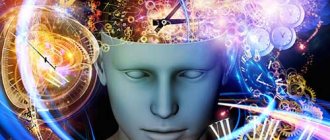What is a worldview? This is something without which humanity would not have reached such heights in modern times - the knowledge of our ancestors, whose experience was passed on from generation to generation, simply would not have reached our days. The structure of the worldview in itself is quite complex; it combines a set of information about the world surrounding a person, as well as its perception; the attitude of the individual to his “I”; life principles and principles; morality, ethics and spiritual world of each individual person.
Factors influencing the formation of worldview
Already in childhood, when a person consciously separates himself from the rest of the world, knows how to speak and think, his own worldview begins to form. Various factors influence what it will be like in adulthood:
- A person’s environment from the first days of his life. The child adopts family traditions and the way relatives communicate with each other, considering them the norm. These are the first steps in the formation of a worldview. Communication in kindergarten, school with peers, and then student, adult life gives new experiences and goals.
- The area where a person was born. The country in which a new member of society was born, its history, the customs of the people inhabiting this territory - the structure of the worldview unites all this into a single whole, into the future achievements of a person.
- Religion. There are quite a lot of world religions, and they significantly influence a person’s perception of what is happening around him. Each faith enriches a person’s spiritual life and protects against wrong and dangerous actions. The canons of some recognized religious organizations are aimed at uniting people and supporting loved ones and those in need.
“Feeding” the worldview with fresh emotions and history contributes to the rapid formation of a person’s individuality. Depending on the factors affecting a person’s daily life and the emotions experienced by society and himself, the vision of the world can be either optimistic or pessimistic.
Ways of formation
There are only 2 options for developing a worldview:
- Active (conscious). A person uses additional opportunities to obtain information in order to create his own, individual outlook on life. Various historical documents, psychological trainings, and philosophical publications help him in this. The individual exerts all his inner strength, studying the features of the worldview and developing new goals, foundations and ideals for himself.
- Passive (spontaneous). Most of modern society uses this way of forming a worldview, receiving information from easily accessible sources, adapting to the conditions around them. As a result, a person who has chosen the passive option of growing his perception of the world, in an effort to become like everyone else, loses his individuality.
Spiritual aspect
It used to be that people were individuals who had spiritual experiences throughout their lives. Modern sciences come to the conclusion that man is a spirit gaining experience in a physical body. Today, more and more attention is being paid to studying the relationship between the Creator and his creation.
The spiritual worldview of people is built on the acceptance or denial of God. Harmony is based on:
- love for the world in general;
- acceptance of current events as a manifestation of divine will;
- connecting to the energy of love through prayer;
- realization of one’s own life through its harmonious living;
- a balanced state in all areas of life.
In the absence of spiritual development, people are filled with resentment, adversity, illness and misunderstanding of the meaning of life.
Structure
The structure of a worldview consists of several interrelated aspects:
- Knowledge. This part includes information received from the first moments of understanding the environment. Knowledge plays a vital role in a person’s life - it is thanks to it that an individual can easily navigate space. The greater the volume of information learned, the firmer and more stable the life position. The knowledge that forms a worldview can be scientific, practical and professional.
- Emotionality. How a person reacts to various life situations is also a component of worldview. Negative and positive emotions, as well as morality and a sense of duty subsequently form the individual’s own view of the world around him.
- Values. A person’s attitude to what is happening around him, according to his understanding of his own aspirations, needs, meaning of life and interests. Values in a worldview are of three types: significant (objects, events and people that evoke strong emotions); useful (practical side of life, clothing, food, shelter, knowledge, skills); harmful (negative attitude towards something or someone, actions, situations, for example, murder, violence).
- Actions. The implementation by a person of his own ideas and views in practice. There can be both positive (helping people, charity) and negative (extremism, rejection of people with physical disabilities, military actions, crimes of various kinds).
- Beliefs. The individual's and society's own views on life. They unite people and are vital for fanatics who unprincipledly follow their values. Beliefs can be firm, true, not amenable to any changes, as well as strong-willed, inspiring, forcing one to fight obstacles.
- Character. The structure of a worldview also includes the personal qualities of an individual, without which the formation of stable views on life is not possible. Character traits that contribute to the growth and development of a worldview: will (achieving set goals), faith (self-confidence, trust in other people), doubts (“self-flagellation” regarding new knowledge or values).
Sources
Worldview is formed on the basis of internal and external processes that allow a person to create his own belief system. Information comes from different sources to be analyzed and absorbed.
- Educational source. A person learns about the world around him through his own experiments and experiences (ordinary knowledge), as well as through scientific training (at school, institute, courses, etc.). Ordinary cognition bears fruit in the form of unsystematized information that allows you to navigate the world. For example, when a person stays in the sun for a long time and gets a blow, he may put the sun at the forefront of the problem and conclude that it is unsafe to be on the beach without an umbrella. This is exactly how ordinary cognition works. But scientific knowledge can already explain the causes of heat stroke, its types and consequences.
- Normative/value source. The normative source is formed on the basis of values, as well as a “code of behavior in society,” which secretly regulates people’s relationships.
Meaningful beliefs allow a person to believe in the truth and rightness of his actions. - Practical source. Knowledge that is not used in practice is not always fertile material for the formation of a worldview.
But if a person uses them to check random information or stable axioms, an internal “evaluator” is activated, which can draw new conclusions based on knowledge applied in practice. - Emotional source. A person is to some extent dependent on his emotions, therefore some ideals, values and beliefs are formed at the level of feelings and intuition.
What is the subject of study of developmental psychology? Find out about this from our article.
Levels
Levels of worldview, according to the intellectual, spiritual development of a person, as well as the presence of logical and philosophical thinking, are divided into everyday perception (level No. 1), professional (No. 2) and philosophical (No. 3).
The everyday worldview, also known as the everyday one, is formed spontaneously, due to the daily life of the individual. People whose worldview is “stuck” at the first level and does not develop further are usually unable to logically explain any phenomenon, as well as restrain emotions in conflict situations - at such moments, feelings prevail over common sense. This level is basic, while other levels of worldview are considered acquired. An everyday vision of the world is formed on the traditions and customs accepted in the society surrounding the individual, as well as on experience and instincts. Thanks to him, a person can freely communicate, analyze, and learn.
A professional understanding of the world is the acquisition of skills and experience in a certain field of activity: politics, science, philosophy, creativity, culture. A person with a professional worldview can share his own ideas and thoughts - information of this kind is passed on from individual to individual, from generation to generation. It is worth noting that many famous political figures, as well as philosophers and cultural figures, had this level.
The philosophical (theoretical) worldview is considered the most developed stage. Having achieved it, a person studies, criticizes, analyzes the attitude, acceptance/non-acceptance of the world around him and his “I” as such. An interesting fact is that only a few can reach this level - the philosophical worldview is accessible only to some outstanding theorists and philosophers.
The path to the human worldview through historical facts
The average worldview of most people, regardless of religious or ideological systems, scientific or everyday knowledge, is based on an ancient system of concepts.
Teacher V.I. Vodovozov, at the end of the 19th century, wrote about the worldview of the ancient Egyptians, where he clearly explained the connection of four systems: substance (matter), the force acting on it (spirit or force fields), the space allocated for it and constantly changing in time. This suggests that generalizing concepts have not been changed since the time of the ancient Egyptians.
Einstein's theory also confirms the fact of interconnection, but of three concepts, excluding spirit. There is no such concept as spirit in science; these are subtle matters that are perceived by the senses. Now they are called physical fields. But the aspect of meaning and ideas, or information in other words, has been lost by science.
We strive for a mosaic type of worldview, but we arrive at abstract spirituality, forgetting about the ultimate generalization of the images that reflect the world. Without measure and matter, space and time cannot exist, and vice versa.
As a result, we can come to an understanding of the existence of three general concepts:
- matter in all existing states (from liquid to vacuum);
- information that represents an image of a material phenomenon that constitutes a worldview;
- measure as the ordering of matters and images in numerical equivalent in the consciousness of the individual.
This begs the question: “So why have people still not come to an understanding of a generalized worldview system? Why do most people perceive stereotypes that have been laid down since ancient times? Judging by many facts, this worldview is deliberately maintained in society.
Forms
The life activity of previous generations leaves its mark on modern society. Forms of worldview absorbed the experience of ancestors, their history, myths and legends, moral principles and foundations. What our forefathers believed also influenced the worldview of modern individuals. The feelings and views of ancient people on the world around them continue to live, despite significant time intervals. Today there are such forms of worldview: public, group, individual.
Types
There are several types of perception of the world, each of which is inherent in a certain person, with his level of development of views, characteristics, emotions, actions, values, feelings. Types of worldview, without exception, affect every aspect of a person’s life, his spiritual world, feelings and thoughts. All of them help to adapt to a given situation and contribute to the acquisition of new skills and abilities. In some cases, one individual may have several types of worldview at once - it all depends on his desire to improve himself.
Types of worldviews distinguished in the modern world: everyday, mythological, scientific, humanistic. Philosophical and historical are also highlighted. And there is one more type, which we will consider in more detail - this is a religious worldview.
Religion is an integral part of worldview
There has long been an invisible struggle between religion and science. Scientific research allows humanity to develop and overcome diseases, while religious knowledge enriches the inner world and helps to survive negative moments in life. The religious worldview is one of the strongest and most effective types of perception of the world. This is explained by the fact that belief in a supernatural, strong being, possessing limitless knowledge, and also controlling moral standards, will, knowledge and physical capabilities of a person, allows you to throw off some of the responsibility for your actions. In addition, faith forces an individual to struggle with difficulties and move forward, gathering groups of like-minded people.
conclusions
The entire history of mankind has been accompanied by two groups of knowledge. Some knowledge was available to everyone, while others were available to a narrow management circle. In order to retain managerial powers, this circle purposefully maintained illiteracy and the inadequacy of society’s worldview. Thus, society was dependent on a group of people.
Plutarch also described the indignation of Alexander the Great regarding the publication by Aristotle, his teacher, of certain philosophical teachings. Alexander, in a letter to Aristotle, pointed out the mistake of promulgating teachings that were intended for selected people.
Aristotle responded with a reassuring letter. He published only part of the teachings, which, without additional explanations, cannot be fully perceived by the people. There are so many texts that are impossible for ordinary people to understand without explanatory keys to them.
Francis Bacon observed nineteen centuries later that knowledge is power. This suggests that there has always been a group of people who had a more perfect worldview.
Humanistic vision of the world
The structure of the worldview of humanistic-minded individuals is a generalization of the principles of humanism, namely love of humanity:
- The most valuable thing in the world is a person.
- Each individual is a self-sufficient person.
- All people have limitless powers for self-improvement, development in all areas of life, and also have the right to demonstrate their capabilities and talents.
- Any individual who is part of society is able to independently change his thinking, manner of communication, and character.
- Every person is capable of self-development and a positive impact on the society around him.
Scientific perception
This type relies entirely on precise thoughts, specifics, facts, devoid of subjectivity. A person who has a scientific worldview is rational, calculating and cold. It so happens that science, philosophy and history have an inseparable connection and numerous common aspects. However, the scientific type of vision of the world allows us to find reasonable answers to every inexplicable phenomenon, in contrast to the historical type, which includes myths and legends.
Philosophical views on life
Philosophy and worldview are practically inseparable concepts. The vision of the world, according to this type, is based on a theory supported by scientific and natural justifications, as well as on logically explainable real (both personal and social) phenomena. Neither philosophy nor worldview of any type would have a place in modern times if they were not closely connected with history. Philosophical teachings say that a person who has such a vision is obliged to devote his life to the study of the world and the endless search for truth.
Methods
If we consider the formation of a worldview as a process associated with learning , we can distinguish the following methods (methods):
- verbal methods (this includes conversations, dialogues, discussions, disputes, explanations, stories, lectures and other forms of interaction between people, during which the listener develops a worldview),
- visual methods (a person becomes an observer in relation to static or dynamic images, films, drawings and entire processes, scientific experiments, experiments, performances, etc.),
- practical methods (mental or practical exercises, independent study of processes and situations, etc.).
What is a worldview? Brief Definition
A generalization of a person’s actions, his desires, attitude towards people, the invaluable experience of previous generations, everyday activities, work on oneself - all this includes a worldview. It is not possible to briefly describe the unique worldview of an individual person, since all individuals are individual, which means that everyone has their own, established understanding of the world. Literally, worldview stands for “look at the world,” look at it and experience certain emotions, accept it as it is, or reject it, creating your own inner world.
Large psychological dictionary online
We also provide our clients with a wide range of psychological services - psychological counseling, psychotherapy, psychodiagnostics, psychotraining, transformation games, etc. for both individuals and organizations.
We also invite you to our new website mvya.ru
☏ Tel. Viber and WhatsApp: +7 (985) 920-07-50. You can get advice from a psychologist, wherever you are, with the service of our Center, psychologist help via Skype.
| Large dictionary of psychology, best psychological dictionary and meanings of psychological terms |
Welcome to the psychological dictionary, and we also offer a new service - free consultation and assistance for pensioners! Free visit to a psychologist for university students!
The role of worldview in the existence of humanity
Taking experience from generations gone by, no one thinks about how exactly it is absorbed and allows human society to move on. The beautiful word “worldview” is an empty phrase for some individuals, but for many this term simultaneously means history, science, the inner world of a person, spirituality, and reliable help in achieving their goals.
What does a worldview give an individual? An established, stable and healthy worldview allows a person to easily adapt to society and self-improvement. Thanks to this, he does not see obstacles in solving problems, achieves promotion, and quickly finds an explanation for what is happening. Worldview gives its owner the ability to correctly set priorities and determine life values. The world's vision is more than just one person's views. Worldview is the thoughts and capabilities of the entire society, the “engine” that pushes evolution forward.
Basic principles
The main principles of the worldview concern the relationship of God with the world and are divided into:
- Atheism is the denial of the existence of the supernatural and gods, and the fundamental principle of everything is matter, the study of which is possible only in a sensual way.
- Skepticism - the principle is based on doubts about the immutability of truth and the denial of the divine destiny of man and the meaning of his life. People who share these views believe that the individual is obliged to determine his own destiny, the main values of whose worldview should be to achieve the maximum amount of pleasure.
- Pantheism is the belief in a certain basis of the world that gave birth to all things. The form of studying reality in pantheism is observation of reality and deduction on the physical level, and mystical intuition on the spiritual.
- Creationism is a principle that affirms God as the first cause of everything, but separates the components that underlie the world from the nature of the Creator himself.
Summarizing what a worldview is, we can define that it is the totality of all knowledge, feelings, views and assessments of a person’s reality in his understanding of the world.










